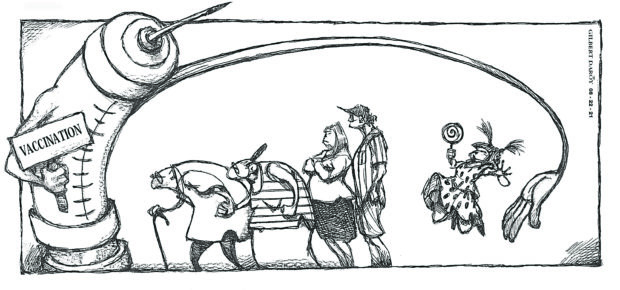COVID-19 and children

A video of a five-year-old girl swathed in oversized personal protective equipment and face mask, stepping into an ambulance alone without the guidance of an adult, went viral this week. The child, from Ho Chi Minh City, contracted COVID-19 from her relatives.
More cases among children are being reported across the world, including in the Philippines, and giving rise to calls for minors to start receiving COVID-19 vaccines. The clamor for children to be vaccinated is also expected to grow with the possibility of schools reopening so students could attend in-person classes again.
Article continues after this advertisementChildren, however, are not a priority under the national vaccination program given the country’s limited vaccine supply. But pediatricians say that all the more the government should speed up vaccinations for adults so that children can be inoculated next, especially amid rising cases brought about by the highly contagious Delta variant.
More than 8,000 minors from Central Visayas have tested positive for COVID-19 since the start of the year. Just last week, four newly born infants were quarantined in Iloilo City due to the infection of a parent, while at least three children tested positive for the Delta variant in Bacolod City—all of them asymptomatic. The children contracted the virus from family members, highlighting the risk of spreading the disease within households even if people are confined to their homes.
While studies in the United Kingdom showed overall extremely low risk for children becoming severely ill or dying from the coronavirus as long as they do not have underlying conditions, experts still agree that vaccinating children is crucial to saving lives. As of Aug. 8, DOH has reported more than 176,000 confirmed COVID-19 cases among children—a marked increase from the 48,411 cases for the period March 2020 to February this year.
Article continues after this advertisementHealth Undersecretary Maria Rosario Vergeire, in an attempt to calm parents, said the rise in infection “[was] also being experienced by all age groups, and not just kids”—not exactly a reassuring statement. Some doctors believe the number of cases of sick children could be higher due to underreporting and limited testing. “What we need to do is for the adults to ramp up coverage. In so doing, the children will also be protected,” said Dr. Fatima Gimenez, chairperson of the committee of immunization of the Philippine Pediatric Society.
The Philippines aims to achieve herd immunity against the coronavirus by the end of the year. But in order to reach that goal, it has to vaccinate 76.3 million of the population. As of Aug. 11, the government has fully vaccinated at least 12.1 million, or 17 percent of the target population eligible for vaccination (meaning, not yet including children below 18 years old) or 11 percent of the total population. Food and Drug Administration director general Eric Domingo said that including minors in the COVID-19 vaccination program would mean inoculating 12 million to 14 million more people.
At the rate the vaccination is progressing, Senate Minority Leader Franklin Drilon advised the DOH to place vaccine orders for children early to avoid a repeat of the scramble for supplies. “There needs to be urgency in the way the DOH is managing our pandemic responses,” said Drilon.
Other countries like Germany, the United States, and Canada have already approved vaccinating children over the age of 12 with Pfizer doses, while the United Kingdom’s health regulator recently greenlighted Moderna for children of the same age. The World Health Organization has previously advised wealthy countries to postpone plans to vaccinate children and instead donate the vaccines to poorer countries in need of supplies. But even with such donations, poor countries like the Philippines still face supply problems, making the vaccination of children a secondary idea at this point despite vaccine czar Carlito Galvez Jr.’s pronouncements that minors aged 12 to 17 will be included in the government’s vaccination program by the end of September or October.
“Fortunately one of the few good things about this pandemic is children are very rarely seriously affected by this infection,” said Prof. Adam Finn from the UK’s Joint Committee on Vaccination and Immunisation. “Children transmit COVID to some extent, although they rarely suffer badly from the disease themselves.”
However, to ensure the welfare of children, the government still needs to explore alternative plans to protect kids from the virus. One of them, as suggested by experts, is to prioritize the vaccination of adults caring for children at home so they could provide a “cocoon effect.”
Vergeire also appealed to adults eligible for vaccination to register for immediate vaccination: “By vaccinating yourselves, you are also protecting the children as you will shield them from possible COVID-19 infection.”
















